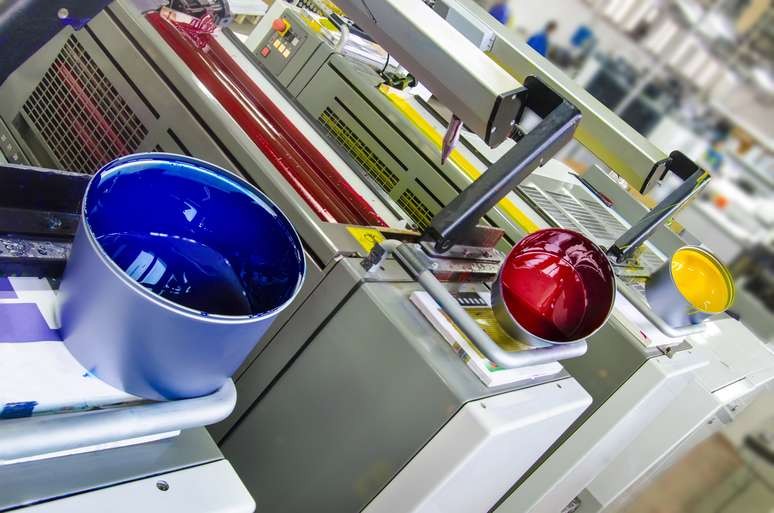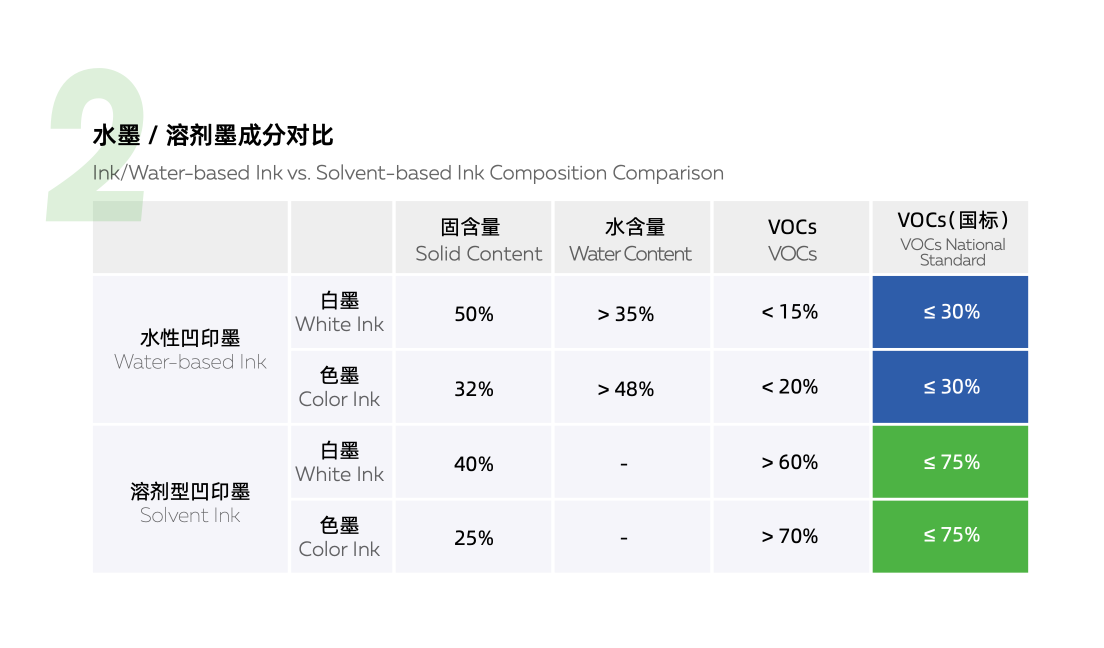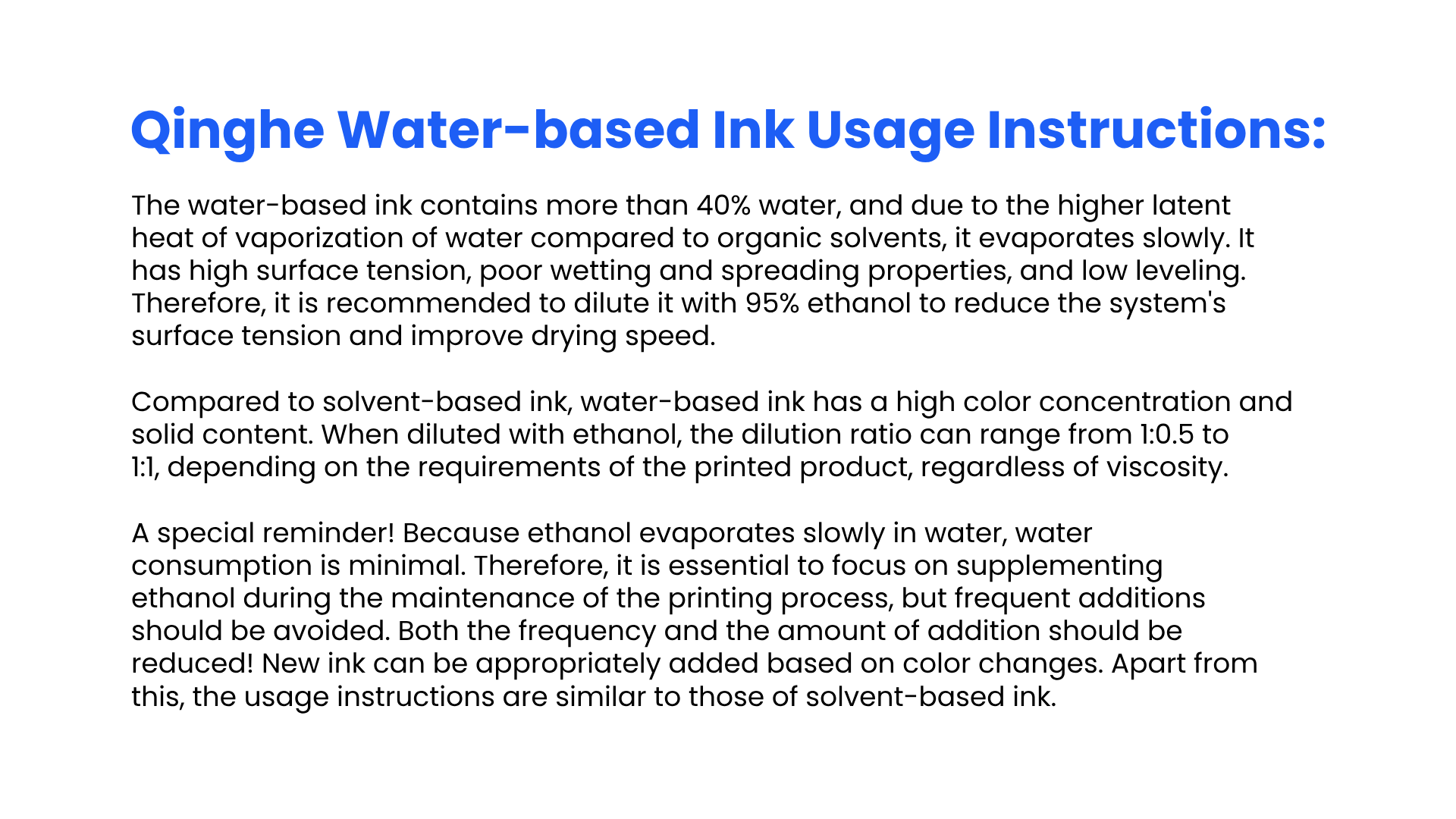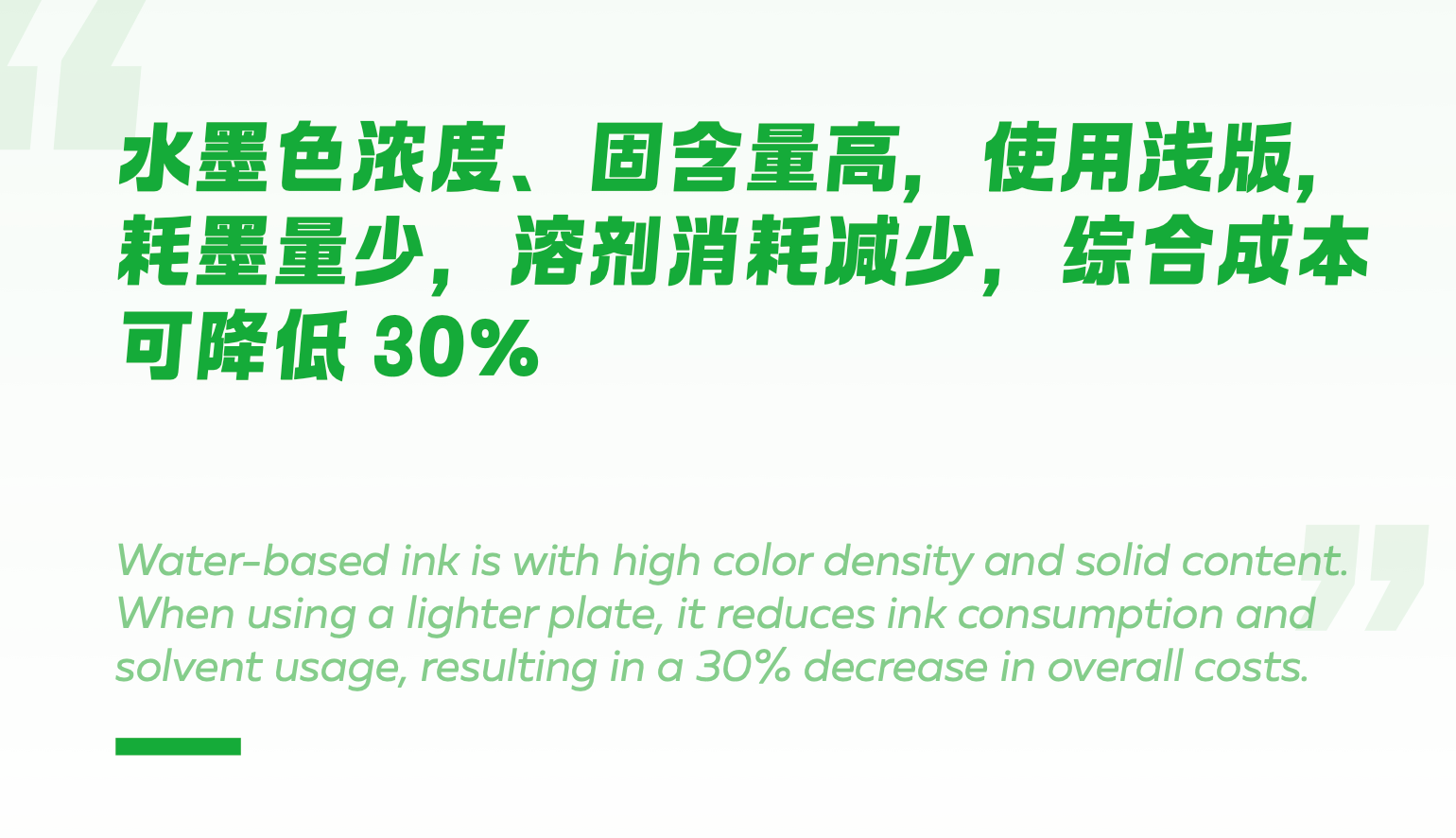Introduction

In the ever-evolving world of printing, the debate between water- and oil-based inks has been ongoing. Both have advantages, but water-based inks are gaining traction with the growing concern for environmental impact. As industries strive to adopt sustainable practices, the shift towards water-based inks is becoming more evident.
The Rise of Water-Based Inks
The rise of water-based inks can be attributed to the increasing demand for eco-friendly and non-toxic alternatives in the printing industry. With advancements in technology, water-based inks have proven to be a viable option for various applications such as textile printing and packaging.
The transition to water-based inks has also been driven by the increasing awareness of the harmful effects of traditional oil-based inks on both human health and the environment. As consumers become more conscious of their products, there is a growing preference for sustainable and non-toxic printing solutions. Water-based inks offer a safer and more environmentally friendly alternative, aligning with many businesses' and consumers' values.
The Popularity of Oil-Based Inks
Oil-based inks have been a mainstay in industrial printing for decades, prized for their:
- Bold and vivid colors: They deliver a powerful punch visually, making them ideal for applications like industrial signage and product packaging, where grabbing attention is key.
- Versatility across materials: Oil-based inks can adhere well to a wider range of surfaces, making them suitable for various industrial printing needs.
However, this popularity has come at a cost:
- Polluting VOC emissions: These volatile organic compounds contribute to smog and air pollution, harming the environment and human health.
- Health risks: Exposure to VOCs can cause respiratory problems, headaches, and even dizziness.
The Greener Revolution: Shifting Away from Oil-Based Inks
As environmental consciousness grows, industries are re-evaluating their printing practices. This has led to a significant:
- Rise of eco-friendly alternatives: Soy-based and water-based inks are gaining traction. They offer comparable print quality with a significantly lower environmental impact.
- Focus on sustainability: Manufacturers and printers prioritize sustainable practices throughout the supply chain. This includes minimizing VOC emissions and using eco-friendly materials.
This shift reflects a positive change in the industry, prioritizing both product quality and environmental responsibility.
The Environmental Impact
Oil-based inks have a significant environmental impact, contributing to air pollution and posing health risks to workers. On the other hand, water-based inks offer a greener solution with reduced VOC emissions and safer working conditions.
Additionally, water-based inks are easier to clean up and require less energy to produce compared to oil-based inks. This means that the overall carbon footprint of using water-based inks is significantly lower, making them a more sustainable choice for printing operations. By choosing water-based inks, businesses can demonstrate their commitment to environmental responsibility and reduce their impact on the planet.
Benefits of Water-Based Inks

Water-based inks have gained popularity in recent years due to their numerous benefits. One of the most significant advantages is the reduced VOC emissions, making them a more environmentally friendly option than oil-based inks. This reduction in volatile organic compounds not only benefits the environment but also contributes to improved air quality and overall health.
1. Reduced VOC Emissions
With water-based inks, there is a significant decrease in harmful emissions, which is crucial for creating a safer and healthier work environment. The absence of strong odors and toxic fumes makes it more pleasant for workers to operate printing equipment without inhaling harmful chemicals. This shift towards water-based inks aligns with the growing emphasis on sustainability and eco-friendly practices within the printing industry.
Additionally, water-based inks are easier to clean up and dispose of, reducing the risk of environmental contamination. This not only benefits the immediate work environment but also contributes to a more sustainable and eco-friendly printing industry as a whole. By minimizing the impact on air and water quality, businesses can demonstrate their commitment to responsible practices and appeal to environmentally conscious consumers.
2. Enhanced Work Safety
The use of water-based inks also enhances work safety by eliminating exposure to hazardous substances commonly found in oil-based inks. This not only reduces health risks for employees but also minimizes the need for elaborate safety measures and protective equipment, ultimately streamlining operations and reducing costs associated with safety protocols.
In addition to improving work safety, water-based inks are also compatible with health and the environment. Unlike oil-based inks, water-based inks do not release harmful volatile organic compounds (VOCs) into the air, reducing air pollution and promoting a healthier work environment. This environmentally friendly feature also aligns with the growing consumer demand for sustainable and eco-friendly products, giving businesses a competitive edge in the market. Companies can demonstrate their commitment to environmental responsibility by choosing water-based inks while maintaining high-quality printing standards.
3. Compatible with Health and Environment
Furthermore, water-based inks are compatible with both human health and environmental well-being. Their composition consists of natural, non-toxic ingredients, making them safe for use on various substrates without posing any harm to consumers or the ecosystem. This compatibility aligns with consumer demand for products that are free from harmful chemicals, contributing to a positive brand image for businesses adopting water-based ink technology.
In addition, the use of water-based inks also contributes to a reduction in air pollution, as they do not emit harmful volatile organic compounds (VOCs) during the printing process. This not only benefits workers' health in printing facilities but also helps improve overall air quality in surrounding communities. By choosing water-based inks, businesses can demonstrate their commitment to environmental stewardship and sustainability, appealing to environmentally conscious consumers and setting themselves apart from competitors who continue to use traditional, more harmful ink formulations.
Advantages of Oil-Based Inks

Oil-based inks have undeniable strengths, making them a mainstay in industrial printing. Here's a breakdown of their key advantages:
Visual Vibrancy: Oil-based inks are renowned for their rich, bold colors. The deep pigmentation makes designs truly "pop" and ensures they stand out, especially for applications like:
- Packaging: Eye-catching product packaging is crucial for grabbing attention on shelves. Oil-based inks can make your products stand out from the crowd.
- Signage: Bold colors are essential for effective signage, whether for industrial warnings or outdoor advertisements. Oil-based inks deliver the necessary impact.
- Promotional Materials: From flyers to brochures, vibrant visuals are key to grabbing attention and leaving a lasting impression. Oil-based inks can make your promotional materials stand out.
Versatility Across Surfaces: Unlike some water-based inks, oil-based inks adhere well to a wider range of materials, including:
- Paper (glossy or coated)
- Cardboard (ideal for packaging)
- Plastic (commonly used for product labels)
- Metal (suitable for outdoor signs and durable packaging)
Cost Efficiency: Oil-based inks can be a budget-friendly option due to their:
- Slower drying time: This allows for more precise application and reduces the risk of smudging. Additionally, it means less ink is wasted as there's less need for multiple coats to achieve desired color intensity. This translates to lower ink consumption and potentially lower printing costs.
However, it's important to acknowledge the environmental impact of oil-based inks:
- VOC Emissions: The solvents used in oil-based inks can release volatile organic compounds (VOCs) into the air. These emissions contribute to smog and air pollution, harming the environment and potentially impacting human health.
While oil-based inks offer significant advantages, environmental concerns are prompting a shift towards more sustainable options. Soy-based and water-based inks are gaining popularity as they offer comparable quality with a lower environmental footprint.
Now, you can see how advantageous oil-based inks are with their high color intensity, application versatility, and cost efficiency. These qualities make them a strong contender against water-based alternatives for certain printing needs.
Comparison in Printing Quality

When it comes to clarity and sharpness, water-based inks offer superior results compared to oil-based inks. The fine particles in water-based inks allow for precise and detailed printing, resulting in crisp and clear images on various substrates. Whether it's for water-based screen printing or industrial inkjet ink applications, the sharpness of water-based inks is unmatched.
Water-based inks are equally impressive in terms of durability and longevity. With their ability to penetrate the substrate, these inks create a lasting bond that ensures the printed image remains intact even after multiple washes or exposure to environmental elements. This makes them the ideal choice for products that require long-lasting prints, such as packaging materials and outdoor signage.
When it comes to color vibrancy, water-based inks truly shine. The vibrant hues produced by these inks are second to none, making them perfect for creating eye-catching designs that pop off the page. Whether it's water-based screen printing ink or general water-based ink applications, the color vibrancy achieved with water-based inks is unmatched by oil-based alternatives.
Industrial Applications

As the demand for eco-friendly and sustainable printing solutions grows, water-based inks have become increasingly popular in industrial applications. Water-based inks are revolutionizing the printing industry with their low VOC emissions and compatibility with various substrates.
Qinghe Chemical's Water-Based Inks
Qinghe Chemical is a leading provider of high-quality water-based inks that offer exceptional color vibrancy and print clarity. Their innovative formulations have made them a go-to choice for industries looking to make the switch to more environmentally friendly printing options.
Qinghe Chemical's commitment to environmental sustainability is evident in their water-based inks, which are free from harmful solvents and VOCs. This not only reduces the impact on the environment but also creates a safer working environment for employees. In addition, their water-based inks are versatile and can be used on a wide range of substrates, making them an ideal choice for various printing applications.
Industrial Inkjet Ink
Industrial inkjet ink has seen a surge in demand due to its compatibility with water-based inks. This makes it ideal for high-speed and high-volume printing applications. Industrial inkjet ink's versatility allows for precise and vibrant prints on a wide range of materials.
Additionally, industrial inkjet ink offers excellent adhesion and durability, ensuring prints remain vibrant and sharp even in demanding industrial environments. This makes it a top choice for applications such as product labeling, packaging, and signage where longevity is crucial. The ability to produce high-quality prints rapidly further solidifies industrial inkjet ink as a go-to solution for businesses looking to streamline their printing processes.
Water-Based Screen Printing
Water-based screen printing ink has gained popularity for its ability to produce vibrant and long-lasting prints while minimizing environmental impact. This versatile option is suitable for various substrates, making it a preferred choice for industries seeking sustainable printing solutions.
Water-based screen printing ink offers a more sustainable alternative to traditional solvent-based inks, containing fewer volatile organic compounds (VOCs) and toxic chemicals. This makes it a safer option for the environment and the individuals working with the ink. Additionally, water-based inks are easier to clean up and dispose of, reducing the overall environmental impact of the printing process.
Environmental Impact
Water-based inks have revolutionized the printing industry with their sustainable practices and eco-friendly solutions. As the demand for greener alternatives continues to grow, water-based inks have emerged as a frontrunner in promoting sustainable printing practices.
1. Sustainable Printing Practices
With water-based screen printing ink and industrial inkjet ink leading the way, sustainable printing practices have become more accessible. These inks are formulated to minimize environmental impact by reducing VOC emissions and promoting a healthier work environment. As a result, businesses can now prioritize sustainability without sacrificing quality or efficiency in their printing processes. This shift towards greener printing options benefits the environment and allows companies to align with consumer demand for eco-friendly products and services.
2. Greener Future in Printing
The shift towards water-based inks not only reduces the environmental impact of printing but also offers significant health benefits for industry workers. Unlike solvent-based inks, water-based inks do not release harmful volatile organic compounds (VOCs) into the air, improving indoor air quality and reducing the risk of respiratory issues among printing professionals. This shift represents a positive step towards creating a safer and healthier working environment within the printing industry.
3. Eco-Friendly Solutions
Water-based inks offer eco-friendly solutions that meet and exceed industry standards. By choosing water-based inks such as Qinghe Chemical's water-based ink, businesses can actively contribute to a more sustainable and environmentally conscious approach to printing.
Water-based inks are not only environmentally friendly but also offer vibrant and long-lasting colors, making them a top choice for businesses looking to make a positive impact on the planet without sacrificing quality. With Qinghe Chemical's water-based ink, companies can enjoy the peace of mind that comes with knowing they are using a product that goes above and beyond industry standards, all while reducing their carbon footprint. By switching to water-based inks, businesses can showcase their commitment to sustainability and attract eco-conscious consumers who prioritize environmentally friendly practices.
Qinghe Chemical Leading the Way

In conclusion, the switch to water-based inks is not just a trend but a necessary step towards a more sustainable and eco-friendly future in printing. With the increasing demand for water-based screen printing and industrial inkjet ink, it's clear that the market is shifting towards more environmentally conscious solutions. As companies like Qinghe Chemical lead the way in developing high-quality water-based inks, it's only a matter of time before these eco-friendly options become the standard in the industry.
Making the Switch to Water-Based Inks
Making the switch to water-based inks is beneficial for reducing environmental impact, improving work safety, and improving overall printing quality. With advancements in technology, water-based inks now offer comparable color intensity and versatility as oil-based inks, making them an easy choice for businesses looking to adopt greener printing practices. Embracing water-based screen printing and industrial inkjet ink is not just a responsible choice; it's also a smart business decision.
The Future of Eco-Friendly Printing
The future of eco-friendly printing lies heavily in the widespread adoption of water-based inks across various industries. As consumer awareness about environmental sustainability grows, an increasing demand for products and services prioritizing eco-friendliness will increase. This shift will ultimately drive innovation and improvement within the water-based ink sector, leading to better quality and performance while minimizing harm to our planet.
Qinghe Chemical has been at the forefront of developing cutting-edge water-based screen printing ink and industrial inkjet ink solutions that meet both environmental standards and industry demands. Their commitment to sustainable printing practices sets them apart as leaders in providing eco-friendly solutions without compromising on quality or performance.

